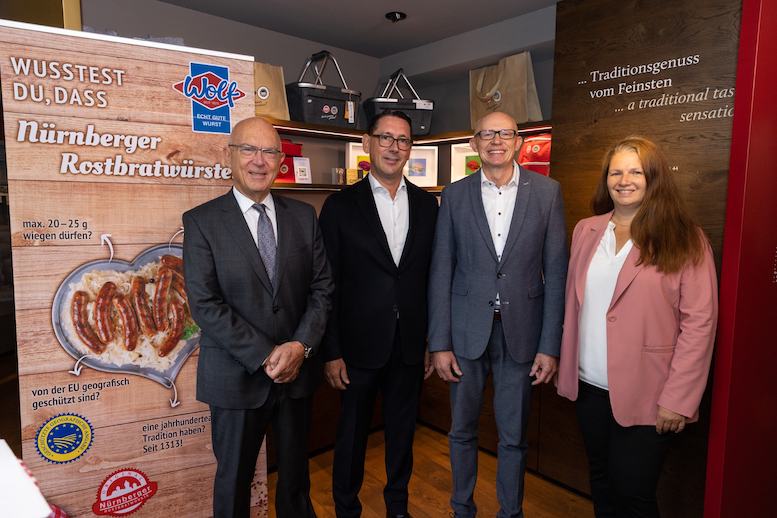The future of the bratwurst secured

While meat consumption in Germany fell by around two kilograms - to 2020 kilograms - per capita per year from 2021 to 55, the demands on food from both the producer and consumer side are constantly increasing. At the same time, regional specialties such as the Original Nürnberger Rostbratwurst are still popular and the bratwurst still often ends up on the grill. In order to provide a platform for this area of tension relating to the future of the bratwurst, the WOLF group of companies initiated a press conference on the subject. As part of this, Christian Wolf and Bernhard Oeller, Managing Directors of the WOLF Group, Angela Völker, Marketing Manager of the WOLF Group and Dr. Rainer Heimler, 1st Chairman of the Nuremberg Bratwurst Protection Association with media representatives on September 28th in the Nuremberg Bratwurst Museum.
The bratwurst in the here and now
In 2021, the WOLF company produced almost 150 million original Nuremberg grilled sausages. According to Christian Wolf, this is mainly due to the regional popularity and the protected origin of the product, which is not only appreciated in Nuremberg itself, but also far beyond the city limits: "The PGI seal guarantees consumers both the proven recipe and a certain quality . This is not only important for fans of the Nuremberg Rostbratwurst, but also for the region – the Original Nürnberger Rostbratwurst is clearly a flagship.” The fact that the inhabitants of the Federal Republic are big barbecue fans favors the continuing popularity of the Bratwurst: “Three out of four German households barbecue at least once a year - that also explains the high sales of bratwurst in Germany, despite declining meat consumption," says Angela Völker
Quo Vadis bratwurst?
Bernhard Oeller, also managing director of Wolf, sees many opportunities in the field of sustainability and thus in the future of the bratwurst. In connection with all sausage and meat products, the topic of animal welfare is becoming increasingly important - and rightly so, according to Oeller: "Funding programs such as the animal welfare and husbandry initiative guarantee greater transparency along the value chain. Seals on the packaging make it easier for consumers to understand the type of husbandry the meat used comes from and thus deal with the product itself in a more easily accessible manner.” In addition to labeling, the condition of the sausage packaging also plays a major role now and will continue to do so in the future. The focus is on recyclability and reduced material consumption, while product safety must be guaranteed at the same time. Here, too, WOLF is already on the rise, for certain cold cut products the conversion to 100 percent recyclability is imminent. The aim is to achieve this with the packaging of the Original Nürnberger Rostbratwurst and in the rest of the WOLF range. Christian Wolf emphasized that the implementation of these measures and thus the future of bratwurst at WOLF also depends on further price developments. Since the costs for electricity and gas for the company have quadrupled, one hopes for a partnership-based consensus with retailers in terms of pricing and thus for business with prospects.
Shaping tradition for the future
dr Rainer Heimler, 1st Chairman of the Protection Association Nuremberg Bratwurst eV, also gave a prognosis for the future of the Nuremberg Rostbratwurst: “The Nuremberg Rostbratwurst embodies food culture, history and identity with its hometown Nuremberg. Their quality is guaranteed by the binding recipe. Protecting the product also secures jobs in the region. These are all values that will always be important in the future.”
The appointment at the Bratwurst Museum confirms that the bratwurst will continue to be of great importance to producers and consumers for a long time to come. Despite the traditional recipe and the centuries-long history, the focus is not only on safeguarding customs, because there is a lot of potential in the bratwurst, both in the here and now and in the future. WOLF is investing in this potential by modernizing the Bratwurst production facility in Nuremberg. Christian Wolf also sees great opportunities in convenience products such as the FORSTER single menus: "By expanding our convenience production in Nuremberg, we are focusing on a trend that we believe will become even more important in the coming years. In addition, our regional specialties, such as the original Nürnberger Rostbratwurst, will continue to be a focus in the future.”
